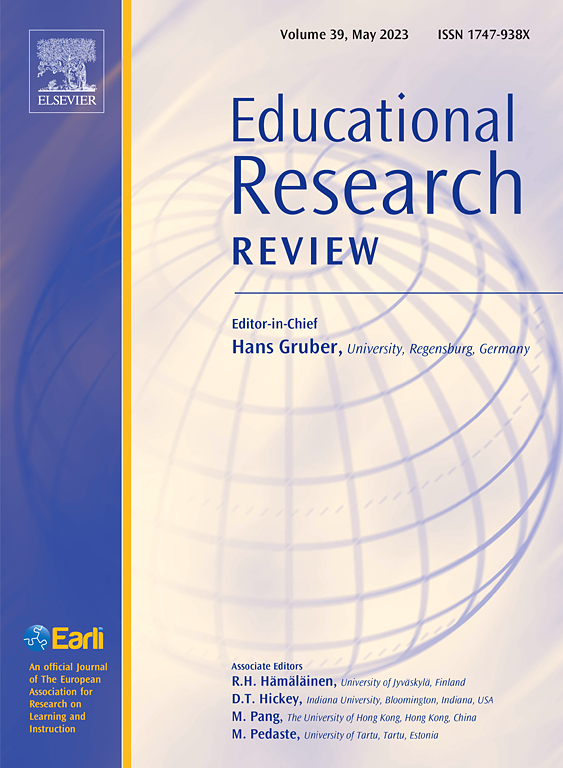学生在校学习成绩的稳定性:一项纵向研究的元分析
IF 10.6
1区 教育学
Q1 EDUCATION & EDUCATIONAL RESEARCH
引用次数: 0
摘要
学业成绩评估在教育中起着核心作用。例如,它们用于教育诊断,为长期安置决策提供信息,并且是大规模教育监测的重要标准。学生学业成绩的阶序稳定性研究结果具有重要的教育研究和实践意义。虽然低稳定性削弱了将学业成绩用于诊断目的的有效性,但近乎完美的稳定性可能表明教育流动性不足。然而,对学业成绩的阶序稳定性的明确研究却很少。因此,我们对这种稳定性高或低的条件知之甚少。本纵向研究的荟萃分析报告了教师分配的学校分数和学校成就测试的秩序稳定性。共编制了1990个测试-再测试相关系数,涉及来自363项纵向研究的740610名个体参与者。估计5级和两年重测间隔的平均秩序稳定性为ρ = 0.70 (95% CI: 0.69, 0.72)。学业成绩的稳定性(ρ = 0.67)低于学业成绩测试(ρ = 0.72)。稳定性在各年级水平上保持相对稳定,并随着重测间隔的增加而降低。随着时间间隔的增加,稳定性的下降在学校分数中比在成就测试中更为明显:这两个指标在很短的时间间隔内相对稳定,但成就测试结果在长期内要稳定得多。学校分数和成绩测试的稳定性因学校领域和国家而异。本文章由计算机程序翻译,如有差异,请以英文原文为准。
The stability of students’ academic achievement in school: A meta-analysis of longitudinal studies
Assessments of school achievement play a central role in education. For example, they are used in educational diagnostics to inform long-term placement decisions and are an important criterion in large-scale educational monitoring. Findings on the rank-order stability of students' school achievement are highly relevant to educational research and practice. While low stability undermines the validity of using academic achievement for diagnostic purposes, near-perfect stability may indicate insufficient educational mobility. However, the rank-order stability of school achievement is very rarely studied explicitly. Therefore, we know little about the conditions under which this stability is higher or lower. The present meta-analysis of longitudinal studies reports the rank-order stability of teacher-assigned school marks and school achievement tests. A total of 1990 test-retest correlation coefficients were compiled, involving 740,610 individual participants from 363 longitudinal studies. The mean rank-order stability, estimated for Grade 5 and a test-retest interval of two years, was ρ = .70 (95 % CI: .69, .72). Stability was lower for school marks (ρ = .67) than achievement tests (ρ = .72). Stability remained relatively constant across grade levels and decreased with increasing test-retest interval. The decrease in stability with increasing interval was greater for school marks than for achievement tests: Both indicators were comparably stable in very short intervals, but achievement test results were much more stable in the long-term. The stabilities of school marks and achievement tests varied between both school domains and countries.
求助全文
通过发布文献求助,成功后即可免费获取论文全文。
去求助
来源期刊

Educational Research Review
EDUCATION & EDUCATIONAL RESEARCH-
CiteScore
19.40
自引率
0.90%
发文量
53
审稿时长
57 days
期刊介绍:
Educational Research Review is an international journal catering to researchers and diverse agencies keen on reviewing studies and theoretical papers in education at any level. The journal welcomes high-quality articles that address educational research problems through a review approach, encompassing thematic or methodological reviews and meta-analyses. With an inclusive scope, the journal does not limit itself to any specific age range and invites articles across various settings where learning and education take place, such as schools, corporate training, and both formal and informal educational environments.
 求助内容:
求助内容: 应助结果提醒方式:
应助结果提醒方式:


